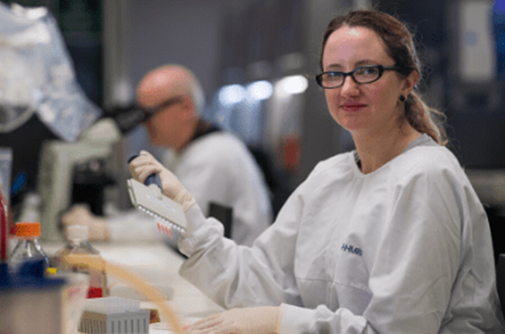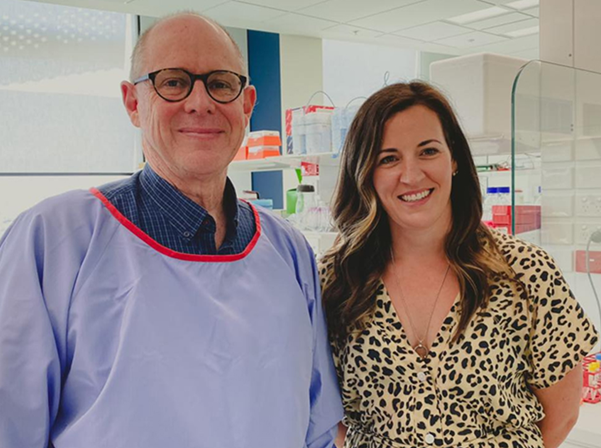Research projects we fund
The Kids' Cancer Project has committed over $75 million to research projects across Australia.


- DIPG
- New South Wales
Col Reynolds Fellow, Dr Evangeline Jackson
Recipient: Dr Evangeline Jackson
Institute: University of Newcastle
Funding: $510,000 October 2024 - September 2027
Early-Career

- Various cancer types
- Victoria
Col Reynolds Fellow, Dr Michelle Tennant
Recipient: Dr Michelle Tennant
Institute: Murdoch Children’s Research Institute (MCRI)
Funding: $508,299 September 2024 - August 2027
Early-Career

- DIPG
- Victoria
Col Reynolds Fellow, Dr Ryan Cross
Recipient: Dr Ryan Cross
Institute: The Walter and Eliza Hall Institute of Medical Research
Funding: $618,000 January 2025 – December 2027
Mid-Career

- Sarcoma
- New South Wales
Col Reynold Fellow, Dr Emmy Fleuren
Recipient: Dr Emmy Fleuren
Institute: Children’s Cancer Institute
Funding: $616,293 April 2025 – April 2028
Mid-Career

- Various cancer types
- New South Wales
Col Reynolds Fellow, Dr Noemi Fuentes-Bolanos
Recipient: Dr Noemi Fuentes-Bolanos
Institute: Children’s Cancer Institute
Funding: $267,000 October 2024-September 2027
Clinical Fellowship - Medical

- Various cancer types
- Queensland
Col Reynolds Fellow, Ms Rachel Edwards
Recipient: Ms Rachel Edwards
Institute: Queensland University of Technology
Funding: $204,000 October 2024 - September 2027
Clinical Fellowship - Allied Health

- Leukaemia
- Victoria
PhD Scholarship recipient, Lorna McLeman
Recipient: Lorna McLeman
Institute: St Vincent's Institute of Medical Research
Funding: $10,000 July 2025 - December 2028
PhD Scholarship - Top Up

- DIPG
- New South Wales
PhD Scholarship recipient, Bryce Thomas
Recipient: Byce Thomas
Institute: University of Newcastle
Funding: $30,000 July 2024 - February 2027
PhD Scholarship - Top Up

- Various cancer types
- New South Wales
PhD Scholarship recipient, Chelsea Valentin
Recipient: Chelsea Valentin
Institute: Sydney Children's Hospital Network
$35,000 July 2024 - December 2027
PhD Scholarship - Top Up

- Leukaemia
- Western Australia
Interfant 21- infant acute lymphoblastic leukaemia Clinical Trial
Recipient: Dr Rishi Kotecha
Institute: ANZCHOG
TKCP Funding: $491,913 July 2023 to June 2028
MRFF Funding: $ 718,933.55
Total Funding: $1,210,846.55

- Various cancer types
- New South Wales
Taming free radicals to silence the epigenome of kinase active paediatric cancers
Recipient: Professor Matt Dun
Institute: The University of Newcastle
The Kids' Cancer Project Funding: $295,945.44 July 2024 to June 2027
Cancer Australia PdCCRS: $295,945.44
Total Funding: $591,890.88

- Brain cancer
- South Australia
Priming the blood-brain barrier to improve drug delivery and treatment outcomes in diffuse midline glioma
Recipient: Dr Kate Vandyke
Institute: The University of Adelaide
The Kids' Cancer Project Funding: $247,733.63 July 2024 to June 2027
Cancer Australia PdCCRS: $247,733.62
Australian Lions (ALCCRF): $100,000
Total Funding: $595,467.25

- Sarcoma
- Queensland
Training Natural Killer cells for Immunotherapy for children, adolescent, and adults with sarcoma
Recipients: Assoc. Prof. Fernando Guimaraes & Assoc. Prof. Wayne Nicholls
Institute: The Fraser Institute – UoQ
TKCP Funding: $100,000 March 2024 to September 2025
The Tie Dye Project: $100,000
Cooper Rice Brading Foundation: $50,000
Total Funding: $250,000

- Leukaemia
- South Australia
Integrating cancer germline genetics, precision medicine and oncology to optimise management of paed
Recipient: Professor Richard D'Andrea
Institute: The University of South Australia
The Kids' Cancer Project Funding: $249,696.40 July 2024 to June 2027
Cancer Australia PdCCRS: $249,696.40
My Room: $100,000
Total Funding: $599,392.80

- Brain cancer
- New South Wales
Col Reynolds Fellow, Dr Aaminah Khan
Recipient: Dr Aaminah Khan
Institute: Children’s Cancer Institute
Funding: $460,543.20
Early-Career

- Various cancer types
- New South Wales
Col Reynolds Fellow, Dr David Mizrahi
Recipient: Dr David Mizrahi
Institute: The University of Sydney
Funding: $502,680.00
Early-Career
Displaying results
1
-
16
of
112
Pages

